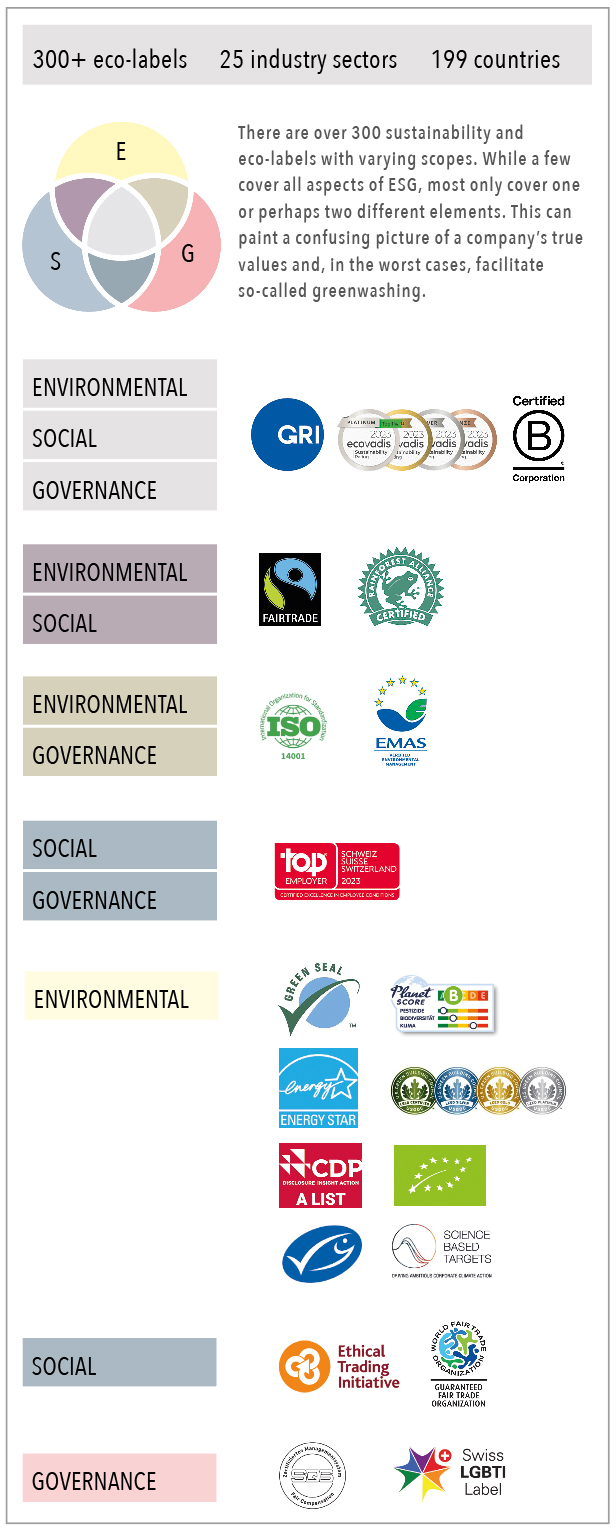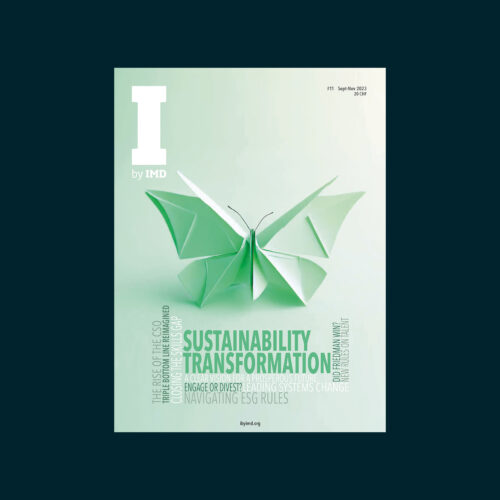
Digital sustainability: it pays to be a leader, not a laggard
Companies that excel in both digital and sustainable transformation attract a stock market premium, according to research. So, how do you tap into that value? ...

by Jonathan Normand, Fabio Monnet Published 26 September 2023 in Sustainability • 11 min read •

At a time when sustainability is increasingly demanded of businesses, the European commerce landscape stands at the precipice of significant transformation. A rising number of regulations and standards, a surge in sustainability labels, and the evolving expectations of stakeholders have set new and complex norms for companies of all sizes and sectors to navigate.
But how do we move beyond the buzzwords and noise and genuinely infuse sustainability into the core of business operations? For the foundation B Lab Switzerland, the answer is clear: we need to push back against green- and impact-washing, cut through the complexity of the label jungle, support rather than demonize companies in their sustainability quest, and be clear about what true sustainability entails. A new legal framework, drawing on the strengths of existing rules and voluntary certification processes, could build the necessary momentum for change.
In today’s business world, companies need to show they are about more than just profits – they need to prove that they are environmentally and ethically responsible, too. Sadly, many companies make false claims or exaggerate their green efforts, so-called “greenwashing”. A study conducted by the European Commission and national consumer authorities indicates that “in 42% of cases, companies’ green claims on their websites were exaggerated, false, or deceptive.” Greenwashing is widespread, for instance, among fast-fashion brands. Using guidelines from the UK Competition and Markets Authority, research by the Changing Market Foundation in its 2021 “Synthetics Anonymous” report found that 96% of sustainability claims by H&M, 89% of ASOS’s green claims, and 88% of Marks & Spencer’s claims fell short of the guidelines in some way.
That’s where sustainability labels come in. They help vouch for a company’s true commitment to doing good. But with over 300 different sustainability labels out there, companies, investors, and consumers can struggle to figure out which labels really matter and what they mean.
To improve the situation, B Lab Switzerland has appealed for greater transparency. We believe we must strive for a clearer, easily navigable system to validate the authenticity of corporate sustainability assertions and to boost consumer trust. This process will be complex, but it is necessary and will require learning on all sides.
The B Lab and its B Corp certification process, for example, actively advocates for collaboration between different actors in the certification movement as a key component in standard development. We work with the Impact Management Project (IMP), a coalition that fosters global consensus on impact measurement and management. This collaborative endeavor is aimed at paving a clear, achievable path to sustainability for corporations and providing comprehensible guidance for consumers.

Collaborative initiatives like these show us a way through what KPMG has called the “jungle” of sustainability labels and point towards a future where credible certification can regain the trust of consumers, investors, and business partners.
Navigating the complexities of the business landscape calls for customers, investors, and corporations to grasp the full breadth of sustainability, spanning all environmental, social, and governance (ESG) dimensions. This purview extends beyond environmental stewardship to incorporate best-practice corporate governance, which demands ethical and transparent decision-making processes as well as social sustainability, promoting elements such as inclusive hiring practices and active support for local communities. As an illustration of how businesses can shine in one area of ESG but fail in another, a company might operate with a carbon-neutral footprint yet maintain questionable labor practices in its supply chain.
B Lab’s B Corp certification offers a more holistic approach and aims to balance profit, people, and the planet. For example, Fairphone, a B Corp-certified enterprise from the Netherlands, champions an ethical approach with its interchangeable phone parts, which not only reduces waste but also contributes significantly to worker rights and environmental sustainability.
Comprehensive certification frameworks such as B Corp, EcoVadis, and others grant clear insights into a company’s overarching sustainability practices. Other product- or process-specific labels cater to distinct sustainability nuances or industry-specific concerns that might not be wholly captured by broader evaluations. Consider a coffee product bearing both Fair Trade and B Corp emblems. From such labeling, a consumer can be confident that, at a foundational level, the company conforms to stringent environmental and social benchmarks, painting a holistic picture of its ESG commitment (B Corp label), and that the coffee has been ethically sourced, accounting for fair compensation and sustainable farming practices (Fair Trade label).
In essence, while all-encompassing certifications give an expansive perspective, specialized badges delve into the details, together delivering a rounded sustainability narrative. B Lab recognizes this balance, collaborating with niche sustainability standards such as Fair Trade. Such partnerships enrich its wide-ranging approach with precise, pointed standards, framing a detailed sustainability map for businesses.

No organization can escape the need to transform to become more sustainable. The need to act is urgent. It calls for strong leadership, difficult decisions, and deep cultural change. In Issue XI, we explore how to build sustainable organizations to succeed in turbulent times.
As Europe introduces new regulatory measures – notably the Corporate Sustainability Reporting Directive (CSRD) and the Corporate Sustainability Due Diligence Directive (CSDDD) – big corporations, both in the EU and in closely aligned markets such as Switzerland, are gearing up for compliance. Given the interconnectedness of European markets and Switzerland’s close trading ties with the EU, it is anticipated that Swiss corporations, too, will eventually need to fall into alignment. Although the directives primarily target larger entities, their indirect repercussions are expected to extend to small and medium-sized enterprises (SMEs).
SMEs, often viewed as the backbone of the Swiss economy, are at a critical juncture. While our experience shows that they are keen to embrace sustainable practices, they also grapple with the cost-intensive nature of non-financial reporting and complying with sustainability standards. Large corporations, with their vast resources and influential market positions, are setting the tone by demanding tangible proof of sustainability via non-financial reporting and high ESG scores. This trend puts SMEs in a precarious position. Without adequate support and foresight, SMEs could find themselves lagging, especially if these sustainability requirements solidify as industry norms.
The situation is exacerbated by potential biases against SMEs in ESG ratings. Limited resources might hinder their ability to measure and present all the relevant information comprehensively, thereby impacting their ESG scores. This, in turn, affects their competitiveness in accessing sustainable finance, which is becoming an integral part of modern business financing strategies. Therefore, public decision-makers must acknowledge and address these challenges head-on, crafting policies that recognize and cater to the unique needs of SMEs.
Furthermore, large corporations, with their comprehensive reporting, emissions reduction, and production standards, often extend these expectations to their supply chain partners. SMEs, if unprepared or unsupported, might find it challenging to meet these standards. Failure to do so risks them becoming side-lined, as larger corporations have the leverage to shift to other suppliers that fit the bill. Meeting the demands set by these corporations requires significant resources and time, which is often a luxury SMEs cannot afford, especially when juggling operational costs and employee welfare.
While private labels and standards are critical in driving the sustainability agenda, their scope often falls short of creating universally impactful change, as they are either not sufficiently known or recognized by consumers, investors, and businesses or do not encompass all ESG dimensions. Recognizing this gap, B Lab Switzerland is championing the introduction of a comprehensive Swiss legal framework. This proposed regulatory structure aims to not only fill the void left by private labels but also to extend support to SMEs.
This legal framework would equip SMEs with the necessary guidance to navigate any more stringent ESG requirements demanded by larger corporations in light of new EU regulations, thereby leveling the competitive playing field and facilitating more accessible financial resources.
Moreover, this proposed framework isn’t exclusive to SMEs. It provides a roadmap for larger corporations seeking proactive alignment with the forthcoming EU directives. Key organizations such as Swiss Leaders and Fédérations Suisse des Entreprises have already voiced their support for the initiative.
We must strive for a more transparent, easily navigable system to validate the authenticity of corporate sustainability assertions and to boost consumer trust.
Through a comparative law study conducted by Professor Giulia Neri-Castracane at the University of Geneva, and in partnership with experts including Professor Jean-Luc Chenaux, Professor Henry Peter, and Dr Michael Mosimann, B Lab Switzerland has gleaned crucial insights about Switzerland’s readiness for the pending changes in regulation across Europe. The study highlights that unlike some of its European counterparts – including France, Italy, and Spain – Switzerland lacks a concrete legislative framework to guide companies in their pursuit of ESG objectives. This finding underscores the pressing need for a holistic framework to support the fair adoption of corporate sustainability in Switzerland and sets the stage for further discourse on this pivotal issue.
Wherever such legislation has been instituted, the quantity of companies electing to qualify under this category significantly surpasses the number adhering to private labels. For instance, in Italy, following the introduction in 2015 of specific legislation inspired by similar laws in the US, more than 3,000 companies have been granted “Società Benefit” status – an official label for for-profit organizations that deliver more than one public benefit and operates responsibly and sustainably, according to definitions laid out in the legislation. This underscores the compelling influence of regulatory frameworks in encouraging and enabling companies to adopt sustainable practices.
There is a growing realization within the Swiss business community of the need for this kind of framework in Switzerland. The Alliance for Sustainable Enterprises – a
B Lab-coordinated Swiss consortium calling for new legislation – now counts more than 200 companies and leadership organizations among its ranks.
We hope that more businesses will partake in this transformative movement as we advocate for a competitive approach that synchronizes with the challenges of innovation and the legal recognition necessities of all Swiss enterprises.
The US, UK, Italy, France, and Spain have instituted legal frameworks that acknowledge businesses (“benefit corporations”) integrating social and environmental goals alongside their profit objectives. A parallel model is currently being proposed in Switzerland. B Lab and the Alliance for Sustainable Enterprises argue that it will deliver clarity to Swiss citizens, consumers, financial operators, and the nation at large. By doing so, it would further bolster Switzerland’s reputation as a hub for business and innovation. The primary characteristics and mandates of these existing frameworks include:
These jurisdictions empower directors of benefit corporations with greater security and flexibility, enabling them to balance a wide range of stakeholder interests without facing criticism or legal challenges.
Benefit corporations are encouraged to enshrine sustainability principles in their statutes, ensuring that these values persist, even through changes in company ownership.
Benefit corporations undergo third-party evaluations, offering a consistent and impartial assessment of their dedication to societal and environmental goals.
Benefit corporations are required to produce annual reports. This mandate includes SMEs, which might not usually fall under standard non-financial reporting obligations.
The uptake of the benefit corporation model in these countries has surpassed that of private certifications, highlighting its practical appeal.
Building on this foundation, B Lab’s proposed legal framework for Switzerland aims to enhance and adapt the model with the following elements:
Reporting for benefit corporations will evolve from “public benefit reporting” to a more standardized non-financial format, aligning Swiss benefit legal framework reporting with European reporting standards.
Inspired by the EU’s CSRDDD, elements of due diligence will be incorporated, ensuring that Swiss benefit corporations not only report on sustainability but also take proactive measures.
A significant focus will be on offering technical and, potentially, financial support to SMEs transitioning to benefit corporation status. This support is designed to ensure that Swiss SMEs maintain competitiveness relative to their European peers.
The criteria and design for the Swiss model’s third-party assessments are under active development, with contributions from experts and stakeholders. B Lab has identified nine primary focus areas for companies considering this new legal status and aiming for a holistic approach to sustainability: Purpose and governance, ethical and anti-corruption practices, human rights, climate management, environmental management, equal opportunities, fair wages, health and well-being, and community engagement.

B Lab Switzerland, as part of the B Lab global movement, supports companies in the B Corp Certification process and has also developed national engagement programs: The Swiss Triple Impact Program, which helps Swiss organizations – regardless of size and sector – to set a clear and tailored sustainability strategy, and the Swiss Boards for Agenda 2030, an alliance of Swiss CEOs and board members committed to sustainability.
To date, the certified Swiss B Corp community includes over 100 certified companies and, at a global level, more than 7,000 companies across 160 industries in 90 countries are certified B Corps. 150,000 firms also use the related B Impact Assessment tool, which evaluates how a company’s operations and business model impact workers, communities, the environment, and customers.
The tool forms the basis of the B Corps certification process, with certified companies required to meet high standards of verified social and environmental performance, transparency, and accountability, from supply chain to employee benefits.

Leader and founder of B Lab Switzerland
Jonathan Normand is leader of B Lab Switzerland, which he founded in 2017. An expert in societal innovation and governance, he participated in the launch of B Lab in Europe in 2014. He also designed the Swiss Triple Impact engagement program and is co-initiator of the Swiss Board Agenda 2030. He contributes to academic publications and research for an inclusive, circular, and regenerative economy.

Postgraduate student at the University of Geneva
Fabio Monnet is a postgraduate student at the University of Geneva. At B Lab Switzerland, he is researching the implications for businesses of EU regulations covering sustainability issues.

17 July 2024 • by Michael R. Wade, Evangelos Syrigos in Sustainability
Companies that excel in both digital and sustainable transformation attract a stock market premium, according to research. So, how do you tap into that value? ...

11 July 2024 • by Stéphane J. G. Girod in Sustainability
A series of watershed events forced CHANEL out of its comfort zone, culminating in the launch of CHANEL Mission 1.5°. With this new strategy, the luxury fashion house embarked on a journey...

5 July 2024 • by Avni Shah in Sustainability
Creative industries have a key role to play in creating positive social change. Here are six key insights to help them achieve their goals. ...

3 July 2024 • by Richard Baldwin, Salvatore Cantale in Sustainability
The EU Corporate Sustainability Reporting Directive (CSRD) will impose comprehensive and standardized sustainability reporting responsibilities on firms, adding unprecedented complexity to mergers and acquisitions. ...
Explore first person business intelligence from top minds curated for a global executive audience